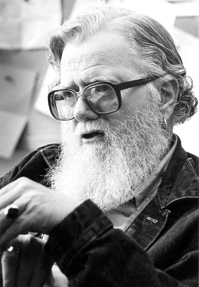 Multifield Historian, Biographer of H. G. Wells
Multifield Historian, Biographer of H. G. Wells
David C. Smith, Bird and Bird Professor Emeritus of American History at the University of Maine, died on November 7, 2009, at age 80. He had been in failing health for several years but nevertheless continued to do research and to publish extensively.
Smith was a native of Maine who served in the Navy for a few years after graduation from high school. He later received his bachelor's degree from a teachers' college that is now the University of Maine at Farmington. After earning master's degrees in both history and education from the University of Maine in Orono, Smith received his PhD from Cornell University in 1965 under the supervision of Paul Gates, the distinguished scholar whom he revered. An expanded version of his dissertation was published in 1972 as A History of Lumbering in Maine, 1861–1960.
Smith's first appointment was at Hobart and William Smith College in Geneva, New York, where he taught for five years. He then returned to the University of Maine, where he taught until his retirement in 1994. He retired with the title of Bird and Bird Professor of History Emeritus.
Where most historians might establish mastery of one or two separate fields, Smith became an expert in five separate fields: Maine and New England history, American agricultural and forest history, World War II, the writer H.G. Wells, and climate history.
When I joined the University of Maine faculty in 1986, Dave had long occupied the largest office in the department. It overflowed with books, journals, manuscripts, and the other familiar items of the traditional scholar. Whether Dave actually knew where various things were was a topic of amusement but also of affection, for he certainly published more than anyone else in the department—and this in a department with several notable scholars—and was highly respected for that.
Smith's first area of expertise, Maine and New England history, led to such books as The First Century: A History of the University of Maine, 1865–1965 (1979) and The Maine Agricultural Experiment Station: A Bountiful Alliance of Science and Husbandry (1980), plus articles in such important journals as Business History Review and Journal of Forest History. Many of these articles were republished as a book entitled Studies in the Land: The Northeast Corner (2002).
Smith's second area of focus, American agricultural and forest history, produced, besides his revised dissertation on lumbering, A History of Papermaking in the United States, 1691–1969 (1970); a coedited autobiography of a Maine woodsman; and articles in Agricultural History, New York History, the Wisconsin Magazine of History, Pacific Northwest Quarterly, Southern California Quarterly, and other important journals.
Smith's third area of expertise was World War II, especially letters to and from servicemen and servicewomen and civilians. With historian Judy Barrett Litoff of Bryant University, Smith coedited several volumes of letters that provided unprecedented focus from the viewpoint of ordinary Americans. Publishers included Oxford University Press, University of Georgia Press, University Press of Mississippi, Fordham University Press, and Scholarly Resources. They also published articles in such journals as The Historian, Prologue, Georgia Historical Quarterly, Maine History, and the Journal of Mississippi History.
Smith's fourth area of expertise was H.G. Wells. He edited The Correspondence of H.G. Wells (1998) in four volumes and wrote a major biography, H.G. Wells: Desperately Mortal (1986), plus articles in history of science and science fiction literature journals.
Smith's fifth and final area of expertise was climate history. He helped establish the university's Climate Change Institute. He more than held his own with the distinguished scientists who, with Smith, made it into a world-famous institution. Smith published extensively on climate change in leading technical journals. These included studies of "Growing Season Parameters: Reconstructions for New England Using Killing Frost Records, 1697–1947" to "Historical Dating of Salt Marsh Dikes in Coastal Maine: Historically Recorded Earthquakes in Eastern Maine" to "A Long, Deep Furrow: Three Centuries of Farming in New England."
As disparate as these topics were, Smith often managed to make interesting and insightful connections between and among them. Indeed, in 1989 he combined his interests to edit Climate, Agriculture, and History for the Agricultural History Center at the University of California, Davis.
It was characteristic of Smith's passion for research that, after he had been diagnosed with the relatively rare Lewy Body Disease, he researched it so extensively that even his doctors wound up learning about it from him. David Smith is survived by his wife, two children, a grandson, and a great-grandson.
—Howard P. Segal
University of Maine
Tags: In Memoriam
Comment
Please read our commenting and letters policy before submitting.






